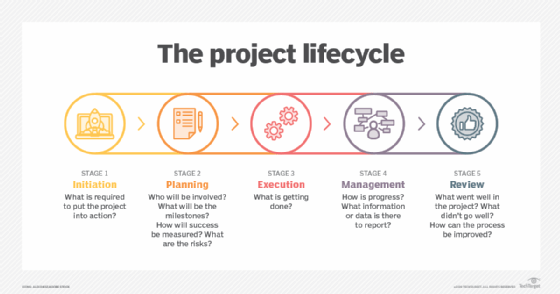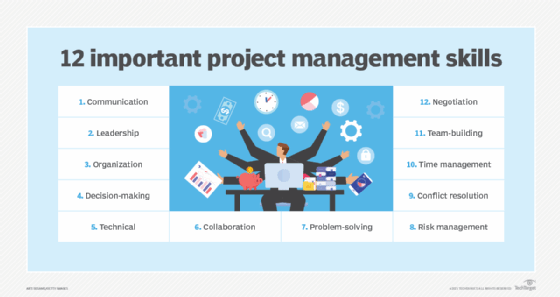What is Project Management Body of Knowledge (PMBOK)?
The Project Management Body of Knowledge (PMBOK) is a document containing standard terminology, best practices and process guidelines around project management as defined by the Project Management Institute (PMI). Currently in its seventh edition, published in 2021, the body of knowledge was created to evolve over time and is internationally recognized as an essential resource for project managers. Referred to as the PMBOK, this guidebook outlines 49 processes that are categorized into five process groups and ten knowledge areas in a matrix structure.
The majority of the guide covers topics specific to project management, but does mention broader themes that overlap such as budgeting, planning, financial forecasting, staffing, organizational behavior and management science. Aligned with similar management standards, the PMBOK is formulated around processes that coincide and impact each other to complete a project. According to the guide, the three phases of a project include inputs, tools and techniques, and outputs. These are used to create the general lifecycle of a project to outline typical project management steps and techniques.
This is an important tool for aspiring and continuing project managers alike, especially those who wish to obtain Certified Associate in Project Management (CAPM) or Project Management Professional (PMP) certifications.
The PMBOK has been accepted by highly esteemed organizations such as the American National Standards Institute, the Institute of Electrical and Electronics Engineers, and the International Organization for Standardization Technical Report.

PMBOK project performance domains
The performance domains in the PMBOK 7th edition are related areas that are essential to a successful project outcome. They focus on delivering value to the project stakeholders.
Here are some key domains explored:
- Stakeholder. This includes having productive and meaningful interactions with project stakeholders. Stakeholders are kept involved in decision-making and implementation.
- Team. The team consists of the members who work on a project to produce deliverables and reach objectives. Leadership and shared ownership can foster a high-performing team.
- Development approach and lifecycle. The development approach can be predictive, adaptive or hybrid. The lifecycle includes the schedule of deliverables and cadence.
- Planning. This domain includes the organization and coordination of the project. Project planning happens before the project starts and throughout the project.
- Project work. Work includes establishing processes, physical resources and knowledge in the project. It needs communication and procurement to get these resources.
- Delivery. This domain includes meeting expectations for outputs and outcomes. These must meet the needed requirements and be of sufficient quality.
- Measurement. This domain involves assessing project outcomes and performance, then implementing responses to meet the objectives.
- Uncertainty. All projects involve levels of risk and uncertainty. This domain involves functions to help understand and mitigate these.
PMBOK principles of project management
The twelve principles of project management are guiding concepts to help project management.
- Stewardship. A steward acts with integrity, care and trustworthiness. They are compliant with standards and have social, financial and environmental awareness.
- Team. Projects are delivered by teams. Teams are made up of individuals who, through collaboration, can deliver more than any individual can.
- Stakeholders. Proactively engage with stakeholders to deliver the best outcomes and customer satisfaction.
- Value. Deliver the greatest benefit by aligning outcomes with value delivered. Value can be delivered throughout the project or at project completion.
- Systems thinking. There are many systems -- external and internal -- that interact with a project. With systems thinking, a holistic view of the systems involved with a project can help adapt for the best possible outcomes.
- Leadership. Any team member can show leadership. Leaders are adaptable to the person and situation and demonstrate desirable qualities.
- Tailoring. Adapt to each project's unique needs. Create the correct number of processes to meet objectives while maximizing value and minimizing cost.
- Quality. Satisfy the stakeholders' expectations and project requirements. Define and meet acceptance criteria.
- Complexity. Identify areas of complexity introduced by system interactions, human behavior and uncertainty. Find ways to limit the effect of complexity on the project.
- Risk. Risk can be a positive opportunity or a negative threat. Evaluate the exposure to risk and find ways to maximize positive outcomes.
- Adaptability and resiliency. Respond to changing conditions to recover from setbacks quickly.
- Change. Prepare those impacted by project outcomes for needed changes. Structure the changes to reduce fatigue and resistance to change.

PMBOK 6th Edition process groups
The PMBOK 6th edition utilizes five process groups to categorize the general management operations needed to run an enterprise or oversee a project.
- Initiating. These are processes that initiate the beginning of a new project, such as identifying a need, addressing a concern, or receiving authorization.
- Planning. These are processes that establish the project's initial proposal, such as limiting the scope, communicating the objectives, and defining the plan of attack.
- Executing. These are the processes completed to advance the project --performing the work defined in the project plan and meeting specifications.
- Monitoring and controlling. These are the processes executed to track and review the project's development, making changes and extending deadlines as needed.
- Closing. These are the processes that quality check all of the work completed for the project and finalize it for official use.
PMBOK 6th Edition knowledge areas
In PMBOK 6th edition, the five process groups can further be broken down into ten knowledge areas, or components, that overlap during different phases of a project.
- Project integration management. This refers to the process of seamlessly combining or bringing together the various moving parts of any project to achieve a common goal.
- Project scope management. This refers to ensuring that each project includes all and only the work identified at the beginning of the project, rather than letting the scope of the project expand as time goes on.
- Project schedule management. This refers to keeping an accurate and updated schedule of events for each project -- including enforcing accountability and adjusting deadlines as necessary.
- Project cost management. This refers to planning, budgeting and controlling the financial aspects of every project in order to keep labor, materials, and equipment costs under the initially approved budget.
- Project quality management. This refers to establishing quality policies and objectives at the beginning of each project so that recurring checks can be made to ensure the project will satisfy everyone's needs.
- Project resource management. Project resource management refers to delegating specific tasks to members of the project team in a methodical way that utilizes knowledge, expertise and skills.
- Project communications management. This refers to determining the most efficient way to distribute, monitor, control and store information surrounding the project with everyone involved.
- Project risk management. This refers to conducting a risk management plan for each project by identifying, analyzing, and controlling risk and establishing a response plan to address issues that might arise.
- Project procurement management. This refers to obtaining the products or services needed to complete the project. Subsets in this knowledge area include procurement planning, solicitation planning, source selection, contract administration and contract closeout.
- Project stakeholder management. This refers to identifying all of the people or teams involved in the project, their roles, expectations, and management strategies.
History of PMBOK
The PMBOK guide was first published in 1996. It was released as the fully realized best practice of the PMI from the previous decade. It replaced the earlier white papers published by PMI. It was released as a single volume for the PMP exam.
The 3rd edition of PMBOK incorporated the changing standards as project management became an accepted field of study.
The PMBOK 6th edition was a major update. It included Agile project management (APM) into the PMBOK.
Over the previous versions, PMI noticed that the PMBOK had become large and difficult to understand. The latest PMBOK 7th edition is a complete rewrite and changes the structure of the PMBOK. It replaced process groups and knowledge areas with performance domains and project management principles.
Learn about essential goal achievement tips for project managers and the principles of APM. See how AI is transforming project management and project management tools and strategies.